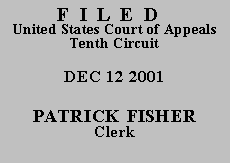

| UNITED STATES OF AMERICA,
v.
CHARLES EDWARD HALE |
No. 00-5248
(D.C. No. 00-CR-55-C) |
Pursuant to the Supreme Court's holding in Anders v. California, 386 U.S. 738 (1967), Mr. Hale's counsel, Michael Abel, filed a brief indicating that he had "thoroughly researched" Mr. Hale's ineffective assistance of counsel claim and found it without merit.(1) Mr. Abel based this conclusion on precedent from this Court holding that ineffective assistance of counsel claims normally should be raised in collateral proceedings rather than on direct appeal. Mr. Abel, in accordance with Anders, also filed a motion to withdraw as Mr. Hale's attorney of record. 386 U.S. at 744. Mr. Hale received a copy of Mr. Abel's brief, and he responded by submitting a letter that requested the appointment of counsel but that did not discuss the merits of the Anders brief.
We have explained that ineffective assistance of counsel claims "brought on direct appeal are presumptively dismissible," United States v. Galloway, 56 F.3d 1239, 1240 (10th Cir. 1995) (en banc). "[O]nly in the very rare instance that a claim of ineffective assistance of counsel is fully developed in the record will we hear it for the first time on appeal." United States v. Boigegrain, 155 F.3d 1181, 1186 (10th Cir. 1998). The record in this case is not sufficiently developed to trigger this unusual exception.
Consequently, we DISMISS Mr. Hale's ineffective assistance of counsel appeal, though we note that this dismissal does not preclude Mr. Hale from raising this claim under 28 U.S.C. § 2255. We also GRANT Mr. Abel's motion to withdraw as counsel.
ENTERED FOR THE COURT
David M. Ebel
Circuit Judge
*.After examining the briefs and appellate record, this panel has determined unanimously to grant the parties' request for a decision on the briefs without oral argument. See Fed. R. App. P. 34(f) and 10th Cir. R. 34.1(G). The case is therefore ordered submitted without oral argument. This Order and Judgment is not binding precedent, except under the doctrines of law of the case, res judicata, and collateral estoppel. The court generally disfavors the citation of orders and judgments; nevertheless, an order and judgment may be cited under the terms and conditions of 10th Cir. R. 36.3.
1.Anders provides that:
[I]f counsel finds [a defendant's] case to be wholly frivolous, after a conscientious examination of it, he should so advise the court and request permission to withdraw. That request must, however, be accompanied by a brief referring to anything in the record that might arguably support the appeal. A copy of counsel's brief should be furnished the indigent and time allowed him to raise any points that he chooses; the courtnot counselthen proceeds, after a full examination of all the proceedings to decide whether the case is wholly frivolous.
386 U.S. at 744.